.png?sfvrsn=97aaf046_0)
CompTIA IT Salary Calculator
Estimate your salary and know your worth during your job search. The calculator includes salary data from 400 different metro areas, covering 85% of the U.S. population.
Four years ago, in 2018, CompTIA launched the inaugural Tech Town Index. The idea was to show how and where technology flourishes in the United States and provide guidance to IT professionals seeking upward movement or looking to put down roots. Every year since then, the report has been updated as we gather new data and identify new trends. But it’s safe to say that in just four years, the world has changed dramatically.
Accelerated, in part, by the pandemic, technology has edged its way into our everyday lives. Many of us rely on it for routine tasks like grocery shopping, doctor appointments and schooling at all levels. We use apps to work out at home, order food, connect with others and even relax. The point is that technology is thriving. Niche companies are popping up left and right to meet this demand, and it’s never been a better time to work in IT.
This fourth installment of the CompTIA Tech Town Index provides IT workers, as well as professionals working in the business of technology, some direction on where opportunity intersects with affordability and quality of life – including remote work.
Based on 2021 job posting data, CompTIA looked at 20 metropolitan areas with populations over 250,000, where demand for tech workers is greatest. The cities were then ranked based on cost of living, number of postings for open IT positions and projected job growth over the next 12 months and the next 5 years. Read more about the methodology.
Last year there were 3.3 million total job postings for open IT positions in the United States. About one-quarter of those (27%) were advertised as remote work.
While there has been some movement amongst rankings – and some newcomers like New York City (no. 16), Hartford (no. 19) and Tallahassee (no. 20) – the top tech cities in the U.S. have remained pretty consistent.
Austin, Texas, came in first place again this year. It’s the third consecutive year Austin has ranked no. 1. But for 2021, San Jose took second place and Dallas fell ever so slightly to third place on the index. Atlanta and Huntsville round out the top five Tech Towns.
Newcomer, New York City took the crown for the highest quantity of IT jobs available (204,883), while Lansing (no. 11) was most affordable and Seattle (no. 9) paid the most – adjusted for cost of living, of course.
Four metropolitan areas fell off the index this year. Boston, Columbus, Denver and Madison all appeared on the 2020 index but didn’t make the cut in 2021.
As more Americans choose to work from home, the 2022 CompTIA Tech Town Index also includes a 21st ranking for the remote workforce. According to a CompTIA IT Career Insights survey, about one in four IT pros cite job flexibility in work hours or location as a driver for initially seeking a career in IT. Therefore, it makes sense to include the remote work factor with regard to the types of IT jobs best suited – and recruited – for work-from-home status.
The reality is, we might not be limited to a certain geographic region anymore. But the concept of Tech Towns is more than a guide on where to live. It’s a big picture view of where ideas are born, where talent is made, where innovation is appreciated and ultimately where technology blossoms.
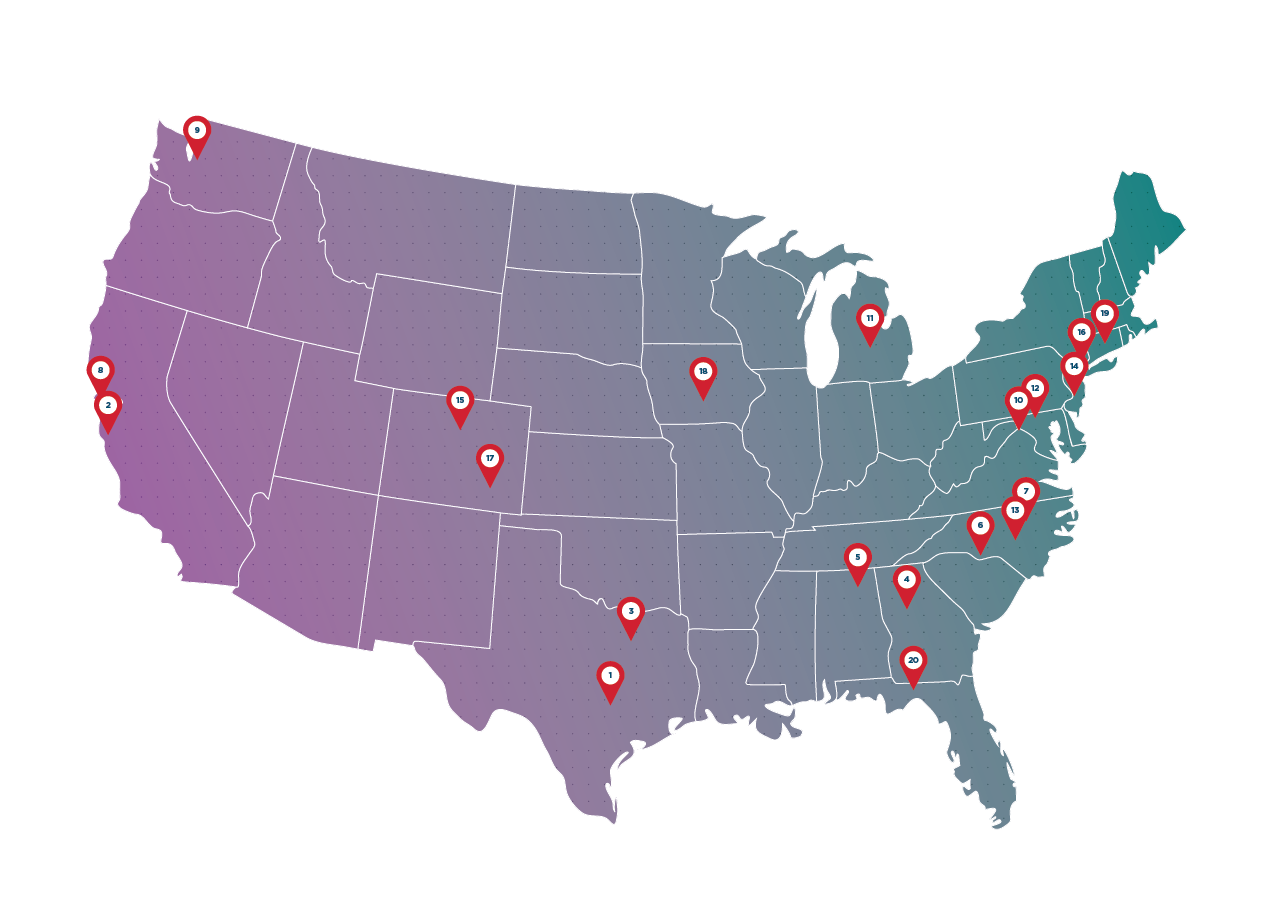
In the 2020 installment of the Tech Town Index, we included an appendix about the remote workforce factor. The addition was made in response to the effect the pandemic was having on IT professionals worldwide. The obvious question then was: What if you could work from anywhere?
Two years into the pandemic, many people are still working remotely, whether by choice or by regulation. Now, it seems the elephant in the room is: How long will remote work last?
According to the CompTIA IT Industry Outlook 2022, workplace studies over the past 18 months have shown that employees today are demanding different requirements in how they approach post-pandemic normalcy. Some may want to remain 100% remote, some prefer a blended model of remote and in-office and some may craft another flexible arrangement that capitalizes on the fact that technology enables many of them to work from anywhere.
The Tech Town Index 2021 data backs this up.
For example, in 2021 there were 3.3 million total job postings for open technology jobs in the United States and approximately 890,000 of them were advertised as “remote” or “work from home” – that’s 27%.* In 2020, the percentage of opportunities that were categorized as remote was 22%.
Some of the benefits of remote work typically include a better work–life balance, less commute stress, location independence and financial savings. A CompTIA IT Career Insights survey among 945 IT pros in the United States in September 2021 showed that one in four IT pros cite flexibility in work hours or location as a driver for initially seeking a career in IT. Furthermore, the same survey shows that when looking for a new job, close to one in five IT pros say the primary reason is a desire to move.
Which IT jobs are most recruited for remote work? Software developers and engineers top the list in 2021 – but they also seem to be the most in-demand IT positions regardless of location. There were more than 250,000 job postings for remote software developers and engineers.
*Note: Not all employer job postings specify remote work, so there is a degree of uncertainty with the data.
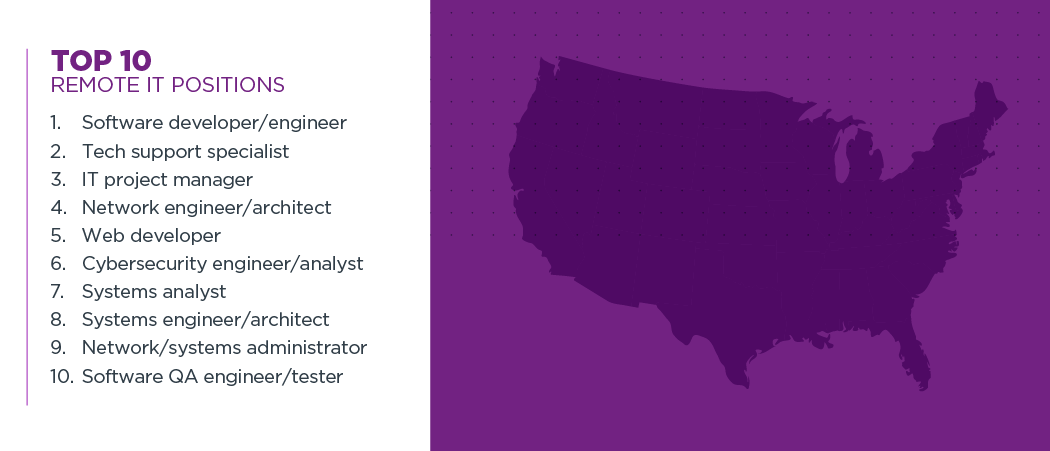
The state capital of Florida, Tallahassee is another newcomer to the Tech Town Index. Locals say the area possesses a vibrant business climate with advanced research and development in local universities and entrepreneurial energy. Currently, 3,055 people are employed in high-tech jobs in Tallahassee’s Leon County, according to the TalTech Alliance – and that number is growing.
Last year, employers in the area advertised for 7,626 technology positions. And the number of tech jobs is estimated to grow to grow by another few hundred over the next five years – a growth rate of about 3%. This growth can be attributed to the long-term investment made by the city, county, chambers of commerce, business leaders and partners, according to the Office of Economic Vitality – a collaboration between the city and county for economic development.
The office cites the new North Florida Innovation Labs, a $17 million, 40,000-square-foot incubator, as one example. The facility will include web labs, a tissue and bioculture room, engineering/light manufacturing space, and a lab for prototype development.
The hope is that after years of staying under the radar, efforts in Tallahassee will produce a surge of innovation and growth – but the capital investment is still lacking. In an area where the wealthiest have invested in real estate, a startup often poses too much risk. Improving the capital landscape continues to be a huge area of opportunity. But while the powers that be work that out, local tech experts say Tallahassee’s enviable geography and growing population make the region a prime candidate for technology companies.
As the tech sector continues to evolve in North Florida, IT pros are earning a median wage of $59,703 with a cost of living just about equal to the national average. This pay is the lowest on the index in 2021 and is perhaps one of the reasons why Tallahassee is pulling up the rear on its way to becoming one of the best places for tech jobs.
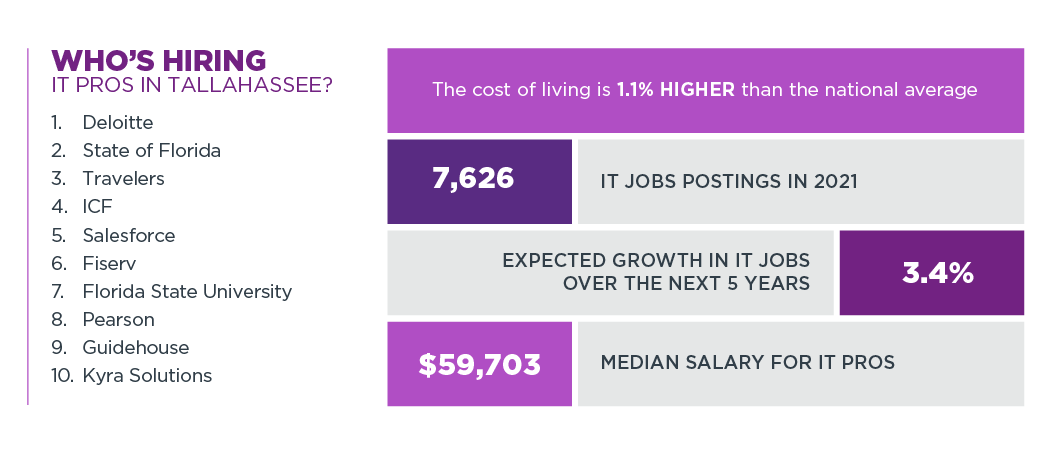
(Hartford-East Hartford-Middletown, CT)
The onset of the global pandemic in 2020 didn’t affect the technology sector as much as it did others. And some regions actually benefited from a reported mass exodus from cities all over the country.
Hartford may just be one of those regions – and perhaps why it has a place on the Tech Town Index in 2021 for the very first time.
In fact, according to Inc.com, areas like Madison, WI; Cleveland, OH; Sacramento, CA; Minneapolis, MN – and yes, Hartford, are among the top cities that IT pros relocated to during the pandemic. It all seems to be working out very well for the metro area.
The CT Tech Council reported that in 2021 there were over 6,000 technology and tech-related businesses in the state, employing some 120,000 people. Connecticut’s growing tech sector includes global digital media brands like ESPN, tech startups coming out of Yale and businesses meeting increased demand for cybersecurity, fintech and health IT services.
In 2021, the Hartford metro area posted a total of 21,683 open tech jobs. Nearly half of those were for software developers and engineers, IT project managers and network engineers and architects.
Companies like Cigna, Travelers, Accenture, Deloitte and CVS Health round out the top employers hiring IT pros. Tech giant Infosys announced it seeks to employ 1,000 more people in the area by 2023.
Tech Town Index data shows that growth is, in fact, imminent here. The number of IT jobs is expected to increase by 3.5% in the next five years, meaning upward of 26,000 jobs by 2026.
IT pros in the Hartford area make a median salary of $92,096, which helps offset the high cost of living. According to Zillow, a single-family home in the area goes for approximately $145,000 and a one-bedroom apartment rents for about $1,200.00.
As one of the best cities for tech jobs, the Hartford area is a great new addition to the Tech Town Index and one that will surely be on the upswing as innovation continues to prosper in Connecticut.
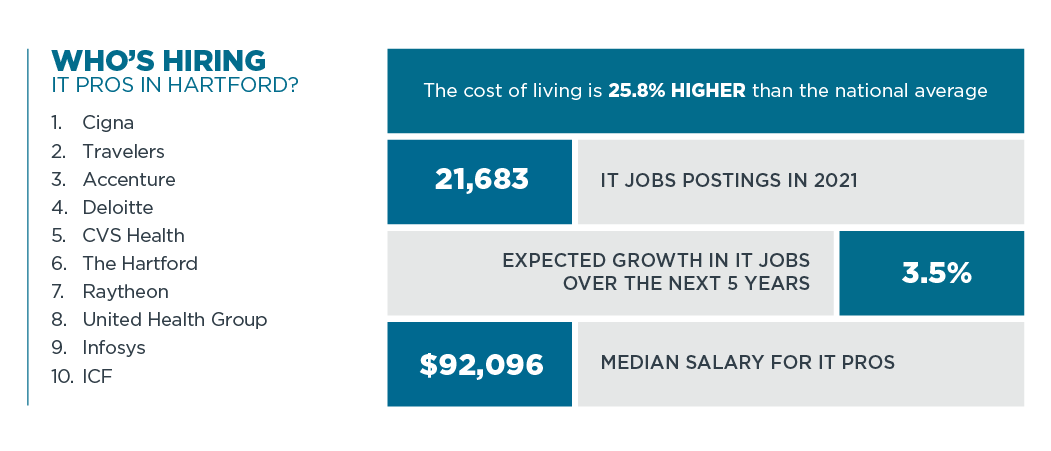
(Des Moines-West Des Moines, IA)
Des Moines, Iowa, has not appeared on the Tech Town Index since the first installment in 2018. Back then, the metro area ranked number 12. In 2021 however, the state capital comes in at no. 18. Known as one of the insurance capitals of the world, the city’s proximity to nearby Iowa State University, entrepreneurial spirit and local support have contributed to a vibrant tech scene.
Iowa State University in Ames is just 30 minutes north of Des Moines – and the technology scene takes advantage of that talent pipeline. The ISU Startup Factory is just one way local participants can gain investment in their business. The 16-weeks of sessions focus on the foundational strategy of building a startup business – a sure-fire strategy for nurturing home-grown talent.
But it’s not the only way. The startup community in Des Moines receives a lot of support for their ideas. Accelerators like the Global Insurance Accelerator, BrokerTech Ventures and TechStars all partner with local entrepreneurs to provide resources and incubators that fuel the latest innovations.
All that activity, of course, leads to jobs. In the past 12 months, the greater Des Moines area posted 15,331 open technology positions. About one-third of those postings were for software developers and engineers and tech support specialists.
Technology companies in industries like insurance, finance, animal and plant genetics, precision agriculture, manufacturing, process control systems, data centers, and digital media and marketing have a place here. With that kind of opportunity, it’s no surprise that technology jobs are expected to grow by 4.7% over the next five years.
Local IT professionals earn a median salary of $88,479 in Des Moines, which is spot on based on the cost of living. And with a cost of doing business sitting at 13% below the national average, according to Moody’s Analytics, Des Moines might just be the next top tech city that nobody knows about – yet.
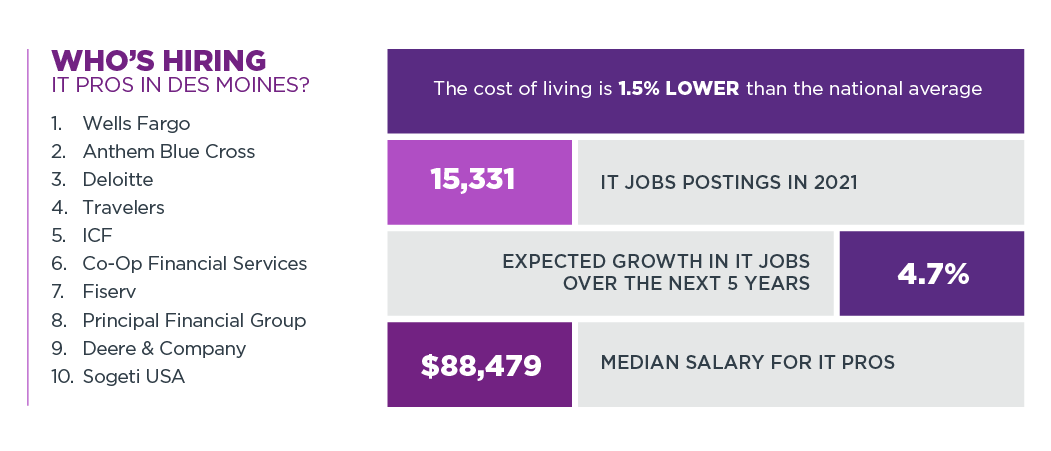
Colorado Springs is intentionally growing a tech ecosystem and making a name for itself as one of the best cities for IT jobs in the United States. With multiple universities and growing industries in aerospace, defense, health care, med tech and cybersecurity, Colorado Springs is officially a tech hub and lands at no. 17 on the Tech Town Index.
According to the Smart Cities Council, Colorado Springs has slowly been turning into a cybersecurity hub. The city employs approximately 3,000 people, offering more than 7,000 cybersecurity positions through 2024 and home to 125+ cybersecurity firms. In fact, a local coalition of organizations, businesses and educational institutions recently launched Cyber Mountain, a brand to position the region as the epicenter of cybersecurity for space operations in the United States.
With a more than 250 aerospace and defense companies in the area, employing 111,000 professionals and contributing $7 billion annually to the local economy, Colorado Springs has the assets to provide a strong base from which to support this growth.
Tech Town Index data shows that in 2021 employers in the area advertised for more than 16,000 open tech jobs – about 1,400 of them were for cybersecurity engineers and analysts. Colorado Springs technology jobs are estimated to grow by another 5% in five years.
Local IT pros earn a median salary of $98,572 in an area where cost of living is about 7% higher than the national average.
But locals say it’s easy to go with the flow in Colorado Springs. In fact, a LinkedIn survey just named Colorado Springs the “most confident workforce in the nation,” citing how workers feel about job security, financial situation and job outlook.
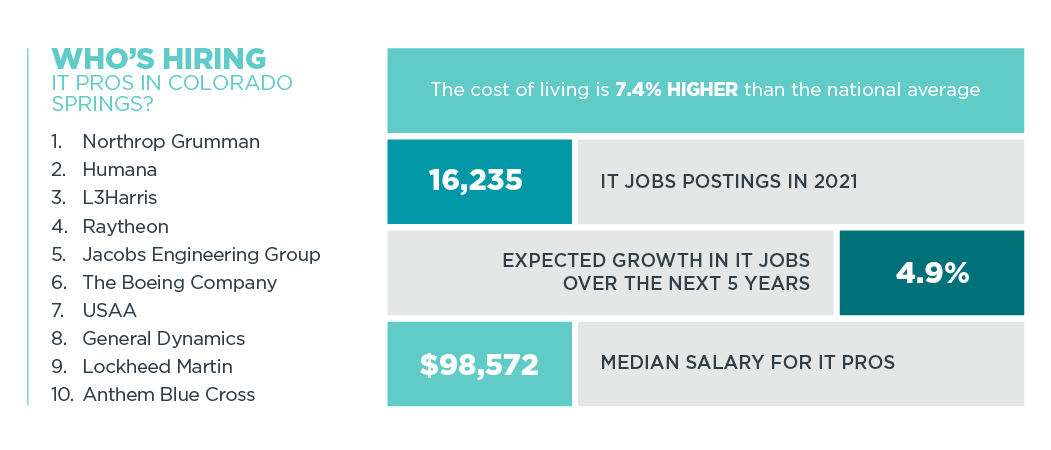
(New York-Newark-Jersey City, NY-NJ-PA)
Leave it to New York City to arrive to the Tech Town Index fashionably late. The Big Apple makes its debut in 2021 at no. 16 and certainly knows how to make an entrance. Beating out Washington, D.C., for sheer number of open technology positions, the
New York City metro area is officially adding tech hub to its already long and impressive resume.
In 2021, employers in the New York City region posted an astounding 204,883 open technology jobs. Furthermore, the number of IT jobs is expected to increase by another 6,275 in 2022 and reach a whopping 366,521 by 2026. The reason for these staggering numbers? The city’s tech sector saw very strong growth throughout 2020 and into 2021.
During that time, several major tech players solidified their commitment to doing business in New York City. According to EDC.NYC, Google added about 1.7 million square feet of office space in Manhattan, Facebook leased 2.2 million square feet of space in midtown and Apple is planning to lease an additional 220K feet in Penn Plaza. In addition, Amazon is leasing new office space in Manhattan and a studio and production space in Brooklyn, and TikTok signed a lease to take over prime real estate in the heart of Times Square.
While this expansion bodes well for IT pros in the area, it’s not just the top dogs setting up shop in NYC. The city now has more than 9,000 startups. Startup Genome said the huge range of companies closing impressive deals in combination with the city’s traditional position as a hub for finance, fashion, media and the arts make it clear that New York City is one of the world’s premier startup ecosystems and a major tech city in the United States.
While the thought of working in the heart of New York City may make your heart beat a little faster, living there requires some deep pockets. Local IT pros earn a median salary of $108,864 in NYC, but the cost of living is 37% higher than the national average – placing the Big Apple near the bottom of the affordability category.
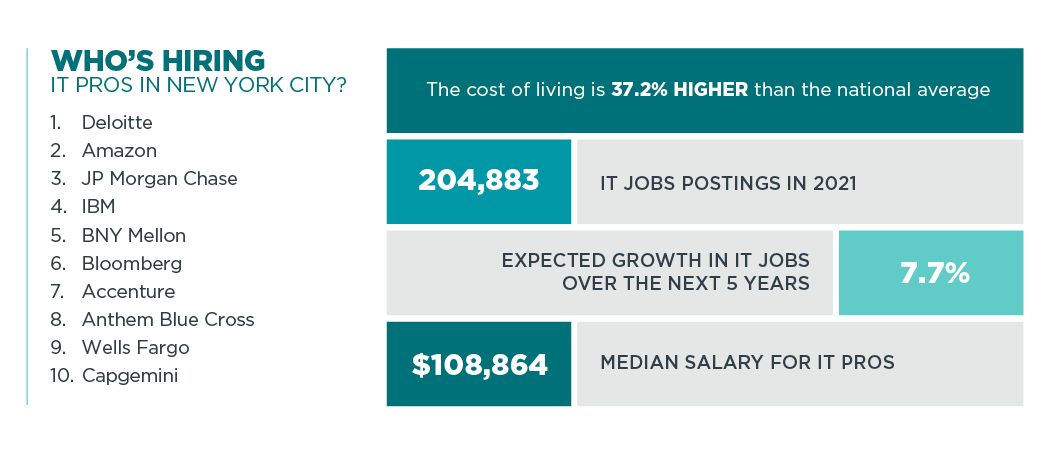
Boulder, Colorado, is a college town. Home to the University of Colorado, it boasts a population of nearly 330,000 and is the top-ranking Colorado metro area on the 2021 Tech Town Index. Fueled by strong entrepreneurship and innovation, the Boulder high-tech ecosystem includes everything from startups to Fortune 500 companies.
In 2021, the Boulder area advertised for 10,477 open technology positions – most of which were for software developers and engineers. Looking ahead, the number of IT jobs is estimated to grow by 8.6% over the next five years.
The IT industry in Boulder has concentrations in the data storage, software and integrated systems, and mobile application development sectors. While Google and Twitter are mainstays of the area, the state in general has become a hot spot for California tech companies to open secondary offices. The Boulder Economic Council also lists aerospace, bioscience and clean tech as key industries in the region.
One area of note is artificial intelligence (AI). According to a study released by the Brookings Metropolitan Policy Program, Boulder is emerging as an early leader in AI, citing $1,067 in AI research and development dollars per worker, 123.6 AI-related patents and 416 AI companies per 1 million workers. Boulder was ahead of the Bay Area when it came to federal AI contracts on a per capita basis, and counts Oracle, Amazon, Soundhound and Apple among its AI innovators.
Local IT pros can earn a good living here, with a median salary of $101,087 – although the cost of living is about 17% higher than the national average, and land sells at a premium in an effort to preserve open spaces. For instance, the median home listing in Boulder currently sits at $899,000, and the average rent for a one-bedroom apartment is $2,451. What would you pay for an average of 245 days of sunshine and 71 inches of fresh power each year in one of the best places for tech jobs?
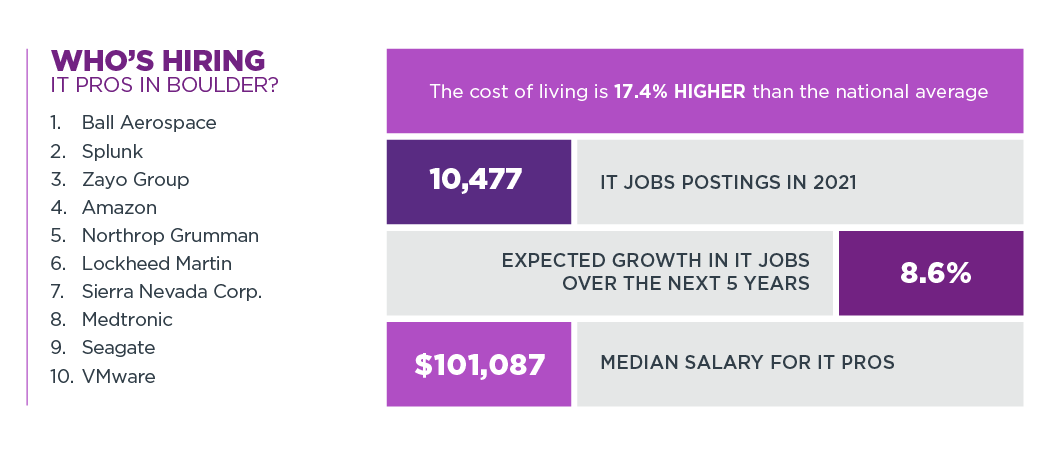
(Trenton-Princeton, NJ)
In 2020, the greater Trenton area just made the cut, ranking no. 20 on the Tech Town Index. But don’t count Jersey out. In 2021, tech jobs surged in the Garden State. The area posted nearly 12,000 open tech jobs in 2021 bumping it all the way up
to no. 14 on the index and reclaiming its spot as one of the best cities for IT.
New Jersey has a lot to offer tech companies. The state holds the title for number one in broadband connectivity and number two for fastest download speeds. Logistically, that’s a bonus, but it’s not all the area has to offer.
Home to the prestigious Princeton University, the state also boasts the highest concentration of scientists and engineers per square mile in the United States – tied only with Massachusetts. Add to that the fact that 42% of the workforce holds a bachelor’ degree (or higher) – that’s 9% higher than the national average – and you have a strong pipeline of talent.
The state Department of Labor and Workforce Development predicts that New Jersey STEM jobs will grow by nearly 10% through 2026 – and that jives with our numbers as well. Of course, more jobs mean more talent and more talent means more competition. Trenton-area employers are paying well to retain IT professionals. The median salary in the area is $99,068 – that’s a $4,000 raise over 2020.
But technology growth in New Jersey isn’t happening organically. There’s been a strategic plan to expand the state’s technology ecosystem. Specifically, leaders are targeting entrepreneurs in health care, telecom, artificial intelligence, robotics and fintech.
For example, the New Jersey Economic Development Authority (NJDEA) is helping to fund innovation with its Entrepreneur Loan Guarantee Program, which will guarantee up to 80% of loans up to $200,000 to New Jersey-based tech companies, enabling companies to grow without having to sell off parts of their companies for capital. Choose New Jersey, a nonprofit that assists and promotes local companies, also will play an important role as a resource for tech businesses. The bottom line is that the infrastructure, talent and connections are present in New Jersey – it’s a matter of who will take advantage of these assets.
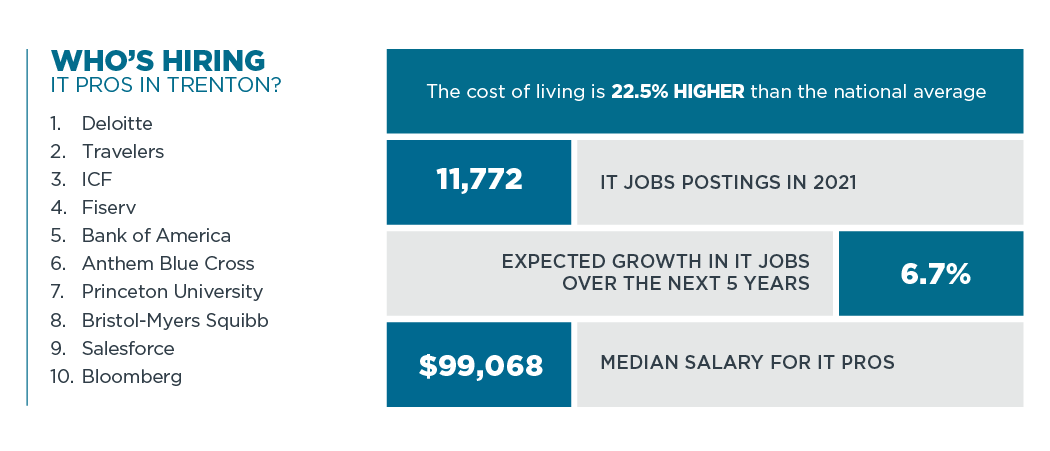
Lucky number 13 belongs to Durham-Chapel Hill, holding steady in the ranks from last year. A big draw for tech companies in Durham-Chapel Hill is prime access to educated, qualified talent due to its sheer proximity to major universities, including Duke University and University of North Carolina at Chapel Hill. In fact, recently the two universities announced plans to launch an entrepreneurial startup hub that will provide advisers, a joint talent network and access to service providers.
With resources like that, it’s no wonder that big things are happening in the Research Triangle Park – one of the best tech cities. For example, late last year GeneCentric Therapeutics, a cancer testing company founded on UNC-Chapel Hill technology, raised $7.5 million from investors and sealed a significant partnership with Labcorp, one of the largest diagnostics companies in the United States.
The area has enjoyed national recognition for its growing tech economy – even being named “the Startup Capital of the South” by CNBC. One of reasons Durham has this reputation is the city’s commitment to fostering economic infrastructure development. When you nurture a culture of innovation, ideas are born. That’s why today more than 300 startups call downtown Durham home.
It’s also why tech talent flocks to this area – or stays post-graduation. In 2021, the Durham-Chapel Hill area advertised for 16,924 open IT positions. Additionally, the number of IT jobs is expected to grow to 24,462 over the next five years.
IT pros earn a median salary of $94,211 in the Research Triangle Park, a figure that is close to the national average. That makes sense given the cost of living here is just slightly lower than the national average – less than one percentage point.
But business keeps coming. Google Cloud announced last year that it will create an engineering hub in Durham, bringing more than 1,000 new jobs to the area. Google cited the region’s diverse and world-class talent as its reasoning behind choosing Durham. Maybe it’s the magic of the triangle, or even lucky number 13. Whatever it is, Durham-Chapel Hill is doing something right.
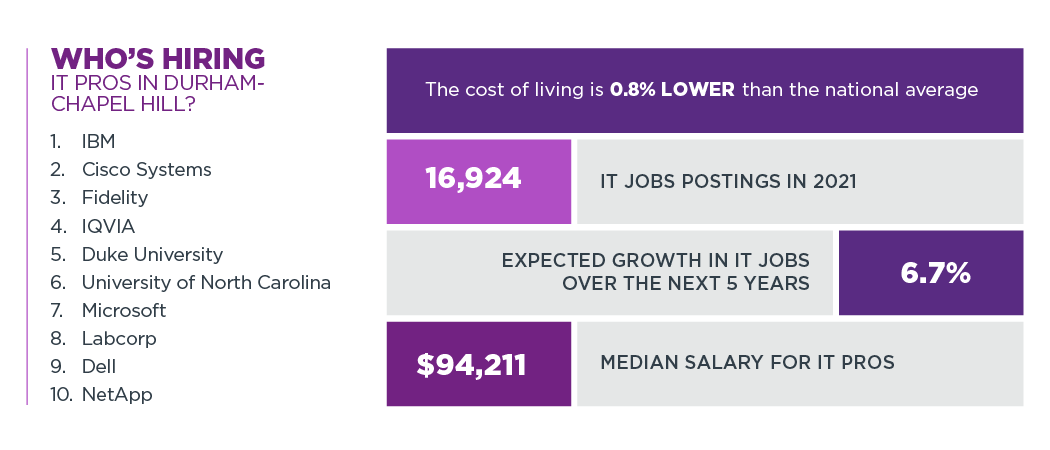
(Baltimore-Columbia-Towson, MD)
Landing at no. 17 on the 2020 Tech Town Index, Baltimore jumped significantly to no. 12 in 2021. Home to the renowned Johns Hopkins University, the Baltimore area has been a longstanding leader in the health care and bioscience space. Top technology employers like Anthem Blue Cross back that up. One of the best cities for computer science jobs, Baltimore is expanding to other tech sectors as of late, and with expansion comes new opportunity.
Amid global efforts to combat climate change, a new report from Saoradh Enterprise Partners (SEP) shows that the Baltimore metro area is one of the top hubs in the United States for clean technology innovation – aka, clean tech. Clean tech has emerged as an umbrella term encompassing the investment, technology and business sectors that deal in clean energy, environmental and sustainable, or green, products and services.
Cybersecurity firms are playing a large role in greater Baltimore’s business landscape as well. The industry is thriving due to the area’s unique proximity to federal cyber assets. Baltimore IT companies are also finding success specializing in cybersecurity, digital health records and video gaming.
This expansion of services is very likely one of the reasons the metro area posted 48,670 IT positions in 2021. Most employers advertise jobs for software developers and engineers. By 2026 it’s estimated that the area will have upwards of 84,000 total tech jobs – that’s a growth of 8.7%.
IT pros in the area can expect to earn a median salary of $105,548, although the cost of living here is 31% higher than the national average, placing Baltimore near the bottom of our affordability category.
To keep moving upward and onward, a new Baltimore-based startup organization is aiming to provide mentorship, networking, educational tools and resources for technology entrepreneurs who choose to headquarter their companies in the city. UpSurge targets startups and businesses focused on using tech to improve equity – according to the group’s CEO. The organization is poised to demonstrate to innovators the benefits of working and living in Baltimore and facilitate investment in their companies.
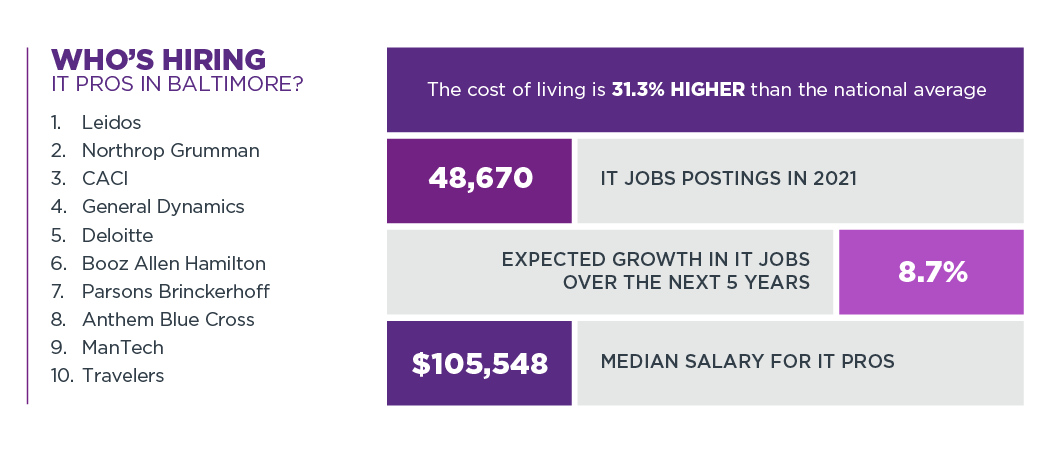
(Lansing-East Lansing, MI)
Interestingly, after a 2-year hiatus from the Tech Town Index, Lansing, Michigan, has made a comeback. The area has landed two ranks higher than it did when it initially made the list in 2018 – moving up from no. 13 to no. 11.
Stereotypically considered a manufacturing state, Michigan has been a pioneer in technology research and development for quite some time. The area is leveraging that expertise – and its assets – to attract tech companies to the Midwest – and it’s beating out other nearby cities like Chicago, Indianapolis and Columbus.
Those assets include a high concentration of engineers, a strong pipeline of tech students trained at top-notch universities, an attractive business climate that boasts low operating costs and a cost of living that is far lower than any other metro area on the index.
The cost of living in Lansing is 8% lower than the national average. According to Realtor.com, the median home price in the area sits at $137,400. With a median IT pro salary of $72,582, living the American dream in Lansing is particularly doable.
In the past 12 months, the Lansing metro area advertised for 8,328 open technology jobs. Furthermore, the number of IT jobs is estimated to grow by 7.7% over the next five years. Leading software development company, TechSmith, is certainly contributing to those figures as it builds a new international headquarters facility in East Lansing. The project is expected to generate a total private investment of nearly $15 million and create 25 highly paid jobs while retaining 275 jobs in the Lansing area. Amazon is also taking the bait, announcing last year that it plans to build its first fulfillment center in the Lansing area.
Currently, top technology employers in the region include Travelers, ICF, Facebook and Fiserv. Companies are generally looking for software developers and engineers, with IT project managers, systems analysts and tech support specialists following close behind.
According to the Lansing Economic Area Partnership (LEAP), the city’s central location in the state offers numerous logistical advantages. And the diverse workforce and “big small city” way of life delivers everything a company needs to operate at consistent and efficient levels.
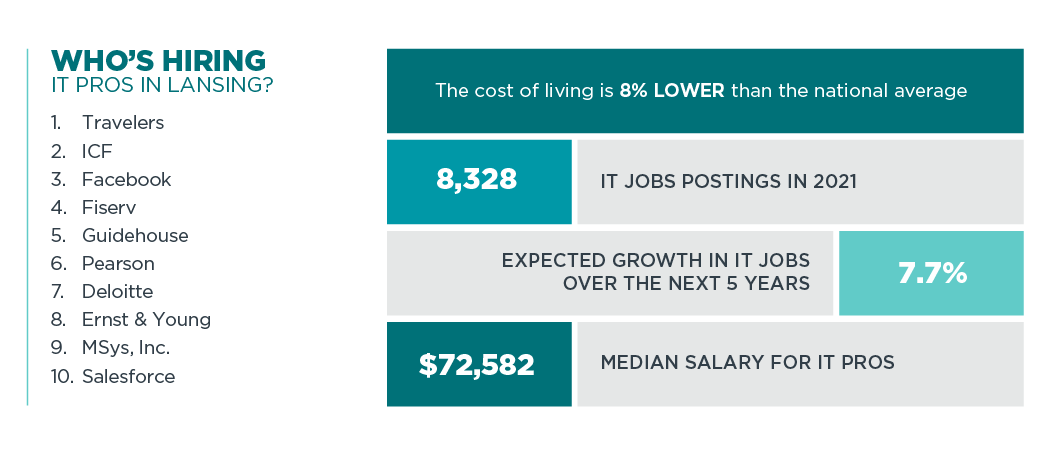
(Washington-Arlington-Alexandria, DC-VA-MD-WV)
In 2020, the greater Washington, D.C., area had lots of jobs – 260,025 open IT positions to be exact. It was the largest quantity of job postings within the index. In 2021, the area still held massive opportunity, to the tune of 191,013 available tech jobs.
There’s no question that living and working in Washington, D.C., equals opportunities across the board. It’s clearly one of the best tech cities in the United States. After all, some of the most important, and powerful, people in the country call D.C. home – and the technology industry is certainly no exception. Growth is imminent.
Naturally government business is big in the nation’s capital. Top tech employers in the area include Leidos, General Dynamics, Booz Allen Hamilton and Northrop Grumman, and they are seeking engineers of all kinds. Nearly half of the job postings in 2021 were for software developers/engineers, cybersecurity engineers, systems engineers and network engineers.
But it’s not all government business here. Local companies not affiliated with the federal government are looking for IT pros as well – including the likes of Amazon, which is building a massive headquarters across the Potomac River in Arlington, Virginia, and will result in hundreds of new hires. That certainly contributes to the prediction that job growth will continue to increase by 6.3% in the next five years. Working here pays pretty well too. The median salary for IT pros is $113,330.
Another benefit of living and working in the D.C. metro area is access to a diverse population. The area ranks in the first quartile when it comes to overall race and ethnicity characteristics within the tech workforce via a metric called Simpson’s Diversity Index. In fact, the Office of the Deputy Mayor for Planning and Economic Development has set specific goals to achieve its vision of becoming the nation’s premier hub for technology inclusion. Some of those milestones include creating 5,000 new tech jobs for underrepresented workers, creating 500 new tech businesses founded by underrepresented entrepreneurs and fostering the most inclusive culture among tech ecosystems on the East Coast.
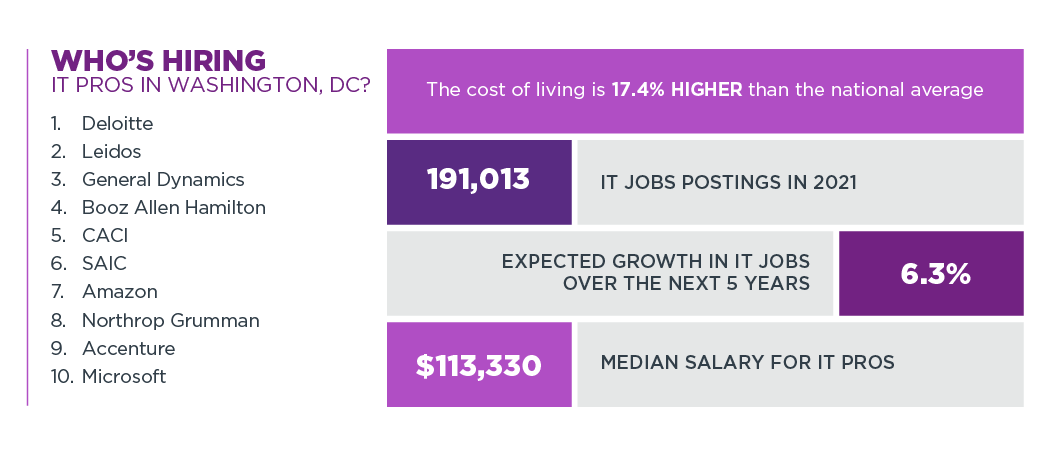
(Seattle-Tacoma-Bellevue, WA)
Seattle has become its own unicorn – in more ways than one. Coming in at no. 9 on the Tech Town Index in 2021, tech experts agree that the greater Seattle area is winning when it comes to attracting and retaining technology businesses and top talent, earning the city the reputation of one of the top cities for tech jobs.
There are a few reasons for Seattle’s continued tech boom – even during a pandemic. The first? Good, old-fashioned room to grow. While downtown Seattle is pretty much at capacity, there is plenty of room for companies to expand on the city’s Eastside.
Some businesses are creating mini campuses, while others are drawn to new developments like Bellevue’s Spring District. Case in point, Microsoft is adding 17 buildings and 8,000 employees to its headquarters in Redmond (about 15 miles northeast of the city) and Amazon is planning to add 25,000 workers in Bellevue.
The second reason? Seattle’s startup scene has never been stronger. According to GeekWire’s funding tracker, tech companies across the Pacific Northwest raised more than $5 billion in 2021 – that’s more than double the previous year. Add to that the fact that venture capital activity is on track to crush last year’s record of $156.2 billion and you have a recipe for success – and unicorns. Right now, the Seattle region is home to at least 12 unicorns. Just five years ago that number was zero.
That type of buzz only attracts more talent. In the past 12 months the area advertised for more than 91,000 open technology positions. Additionally, tech jobs are expected to grow by 2.5% in the next year and by 8.7% by 2026.
And while Seattle isn’t necessarily known for being particularly affordable – median home prices sit in the $750,000 range – our data shows that Seattle area employers take that into account. The median salary for an IT pro is $131,392. When adjusted for cost of living, Seattle ranks no. 1 for compensation.
Of course, living in the aptly nicknamed Emerald City has perks that go beyond monetary value. Seattleites take outdoor recreation seriously, and there’s no shortage of options – think Mount Rannier National Park, the Puget Sound, Olympic National Park and the Mt. Baker-Snoqualmie National Forest.
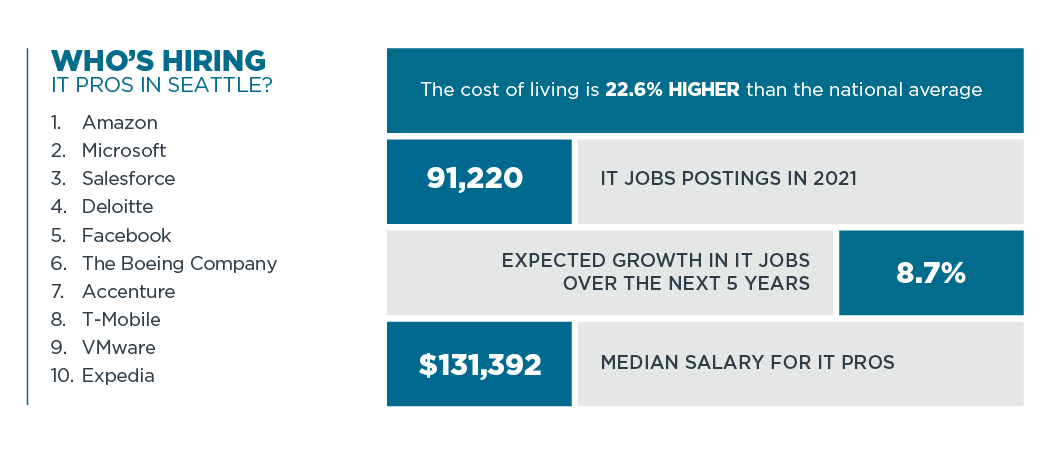
(San Francisco-Oakland-Berkeley, CA)
In 2020, amidst the pandemic, the story in San Francisco was all about workers fleeing the city. The rumored exodus of tech workers from the Bay Area was big news. But sometimes what you hate about where you live and work can also be what you love. Although the San Francisco metro area slipped to no. 8 on Tech Town Index in 2021 (from no. 5 in 2018 and 2019 and no. 7 in 2020) true San Franciscans may be making a return to one of the biggest tech cities in the United States.
Once such indicator of this is housing prices in the area. According to the California Association of Realtors, in December 2020, median single-family homes bottomed out at a paltry $1.58 million. That number recently hit $1.9 million, which is higher than any pre-pandemic figures – and higher than the infamous Los Angeles.
But don’t let that number scare you away. While it’s true that San Francisco places dead last in terms of affordability, it makes up for it in opportunity and pay. In 2021 the area advertised for a whopping 124,375 open technology jobs – and job growth is expected in spades. By 2026, the area is predicted to have about 212,000 tech positions. That places the Bay Area near the top of expected job growth. And IT pros are easily making six figures here. The median salary sits at $132,800 – nearly the top median salary on the list, with San Jose edging out at $148.607.
Of course, one of the reasons people can’t seem to stay away from this city is the culture, diversity and innovation that comes with collaboration of genius minds. In fact, the San Francisco, Oakland and Berkeley metro area scores in the first quartile for overall race and ethnicity characteristics per the Simpson’s Diversity Index.
Even if San Franciscans are finding their way back to Silicon Valley, remote work is still a huge factor for the tech industry and the local economy. According to the San Francisco Controllers Office, approximately 20% of current technology job listings for the city are remote. To tackle this issue head-on, tech companies are coming together through apprenticeship programs to make neighborhoods around tech hubs cleaner and safer, in an effort to woo workers back to the city.
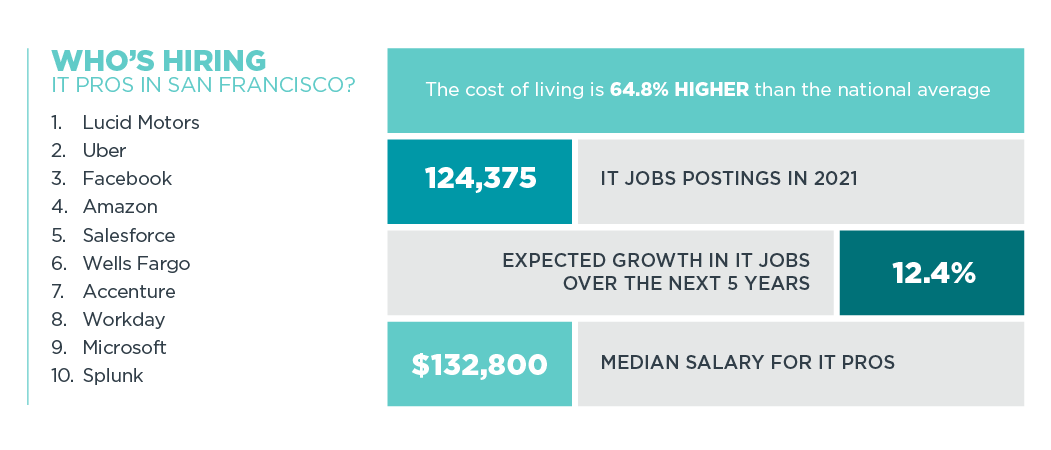
(Raleigh-Cary, NC)
The Raleigh area has been a force to reckon with on the Tech Town Index for the past three years. Boasting a no. 2 rank in 2018 and 2019 and falling ever so slightly to no. 3 in 2020, the no. 7 position this year may come as a surprise. Especially since big things – hello, Apple – are happening in the heart of the Research Triangle Park.
In April 2021, Apple announced its plans to invest more than $1 billion in North Carolina and build a new campus and engineering hub in the Raleigh area. Apple said the new campus will create 3,000 jobs in software engineering, machine learning and artificial intelligence – but didn’t offer a timeline for when it would be operational. As part of the investment, however, Apple plans to set up a $100 million fund to support schools and community programs across the state.
That type of reinvestment is just part of Raleigh’s continuing plan to work with local universities, nonprofits and the private sector to build a tech-savvy workforce. Raleigh’s office of economic development and innovation says the city is examining ways to help the existing workforce gain the skills, education and experience to compete and succeed in the local economy. And if you build it, they will come.
In total Raleigh advertised for 41,240 technology jobs this year alone – and more than 11,000 of those were for software developers and engineers. Experts predict that total number of tech jobs will grow to approximately 44,500 by 2026.
An IT pro living and working in Raleigh can expect a median salary of $95,786. And while housing can be expensive in this area, the general cost of living is the lowest of the three Carolina metro areas on the index.
Perhaps the reason Raleigh dropped a few spots this year doesn’t actually have much to do with the area’s tech scene at all. After all, it is widely considered to be a major IT hub in the United States. Maybe other metro areas like Atlanta and Huntsville just stepped it up this year.
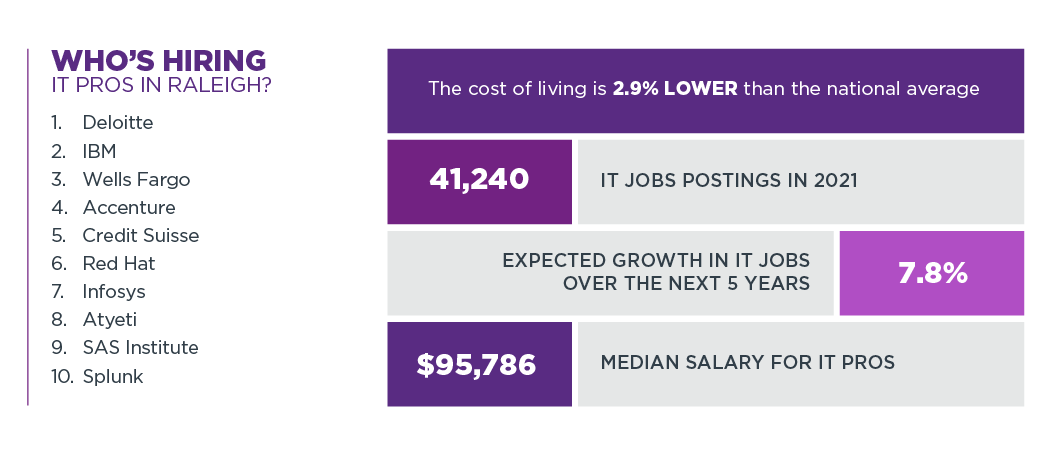
(Charlotte-Concord-Gastonia, NC-SC)
North Carolina has always been an East Coast tech hub and one of the best cities for IT jobs. Charlotte, Raleigh and Durham-Chapel Hill appear on the Tech Town Index each and every year. Total tech jobs statewide are approximately 733,000, including 61,000 in Charlotte.
With a reputation as a financial and banking epicenter, Charlotte may not have always been at the forefront of technology. But as more jobs in non-technical industries require technical know-how, it makes perfect sense that the technology industry would grow as well.
In the past 12 months, in fact, Charlotte alone advertised for 53,504 open tech positions. Furthermore, the number of IT jobs is expected to grow by 2.5% over the next year and by 8.8% in the next five years.
Charlotte’s financial technology and health tech leaders recently announced plans to launch the Carolina Fintech Hub (CFH) to boost those numbers. CFH is partnering with MassChallenge to create The Meta Lab. The initiative will help identify startups and innovators and connect them to corporate clients who need to solve big challenges. The strategic plan behind The Meta Lab is to cultivate a world-leading ecosystem for innovation and collaboration that will also lead to reinvestment in the area and even more growth.
Today, Charlotte generates an average of 6,000+ IT professionals each year – which makes it a great destination for IT companies and startups alike. What’s more, approximately 37% of IT company CEOs are women here.
Whatever the industry, it’s clear that there’s money to be made here and a good quality of life to be had. IT pros can expect to earn a median salary of $93,600 in the Charlotte area and a cost of living that is nearly 2% lower than the national average.
One of the upsides to living in Charlotte is the flat income tax rate – no matter what you earn. North Carolina also boasts low property taxes and sale taxes near the national average, making your money stretch even further.
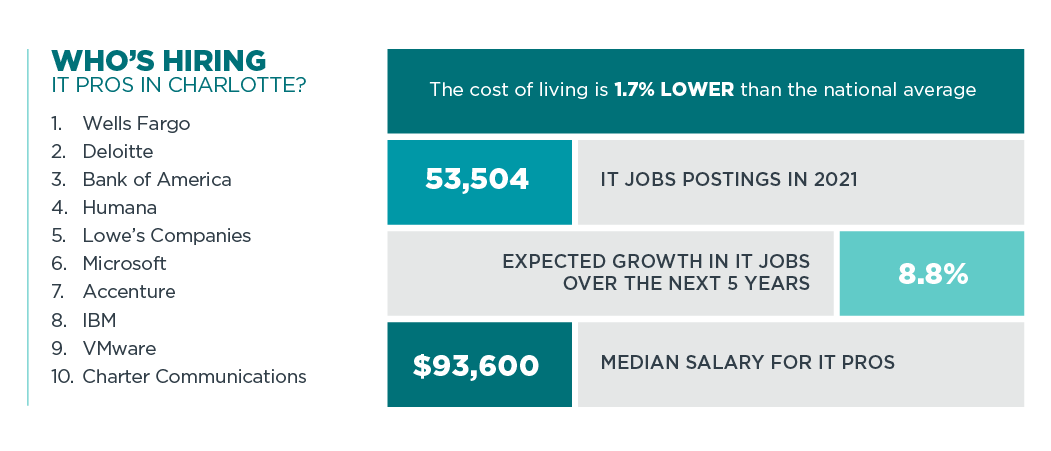
The first two years of the Tech Town Index, Huntsville, Alabama ranked no. 10 and rose to no. 9 last year. This year, Huntsville claims the no. 5 spot, and it’s a well-deserved ranking. When you think of Huntsville, you might conjure up images of military defense and aerospace technology. While that’s a big part of what put the Rocket City on the map, today Huntsville attracts all kinds of IT talent, making it one of the best places to live for tech jobs.
In 2021, Huntsville employers posted 14,085 available technology jobs. Additionally, the number of IT jobs is expected to grow to nearly 20,000 in just one year and to about 21,000 in five years. What’s the reason for the one-year surge? Simply put, companies want to be in Huntsville – and they need IT pros.
Several companies have expanded or relocated to the Huntsville area in the past year, including Dynetics, Torch Technologies, Invariant Corporation, Nippon Express, Aldez Palco, Ridgeview Industries and TriRx Pharmaceutical Services. Special Aerospace Services (SAS) moved to Huntsville in the fall of 2021 as well. In total, these new economic development projects are estimated to bring 510 new jobs and more than $71 million in investment to the Huntsville community.
Investments like this not only create new job opportunities, but they also help IT pros maintain a certain quality of life. And in Huntsville, your money goes pretty far. The median salary for an IT pro in this area is $98,251.
But Huntsville is growing – and its infrastructure is keeping pace. This past summer, development plans were announced to introduce Upland Park, a 60-acre, $200 million mixed-use development in the community’s Cummings Research Park. The development will feature a senior living community – which speaks to the population’s want and need to accommodate families putting down roots in Huntsville who want parents and grandparents nearby.
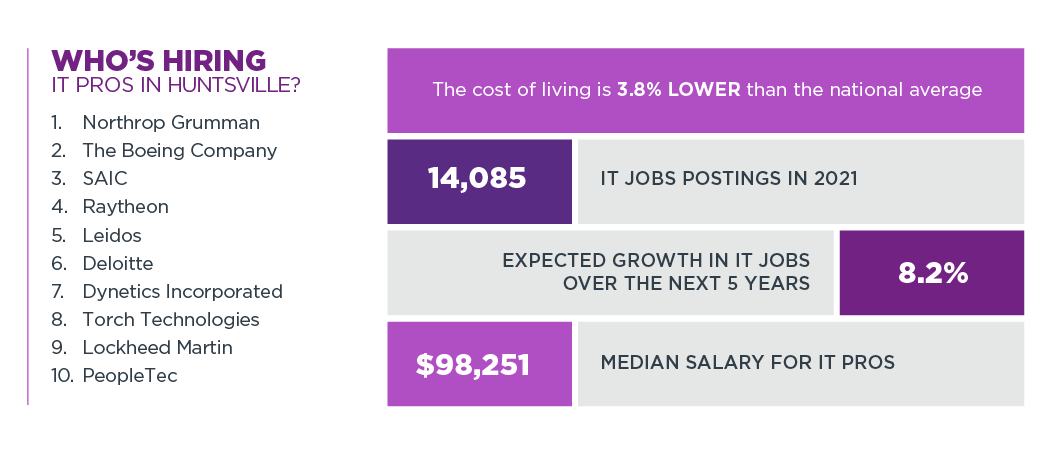
(Atlanta-Sandy Springs-Alpharetta, GA)
While Texas and California have been basking in the limelight, Atlanta has steadily been doing the work and climbing the ranks as a legitimate and sought-after IT hub in the United States. Making its debut on the Tech Town Index in 2018 at no. 9, Atlanta has always been a presence. Coming in at no. 8 in both 2019 and 2020 showed the progress the region was consciously making. This year, that hard work has paid off as the Atlanta metro area cracks the top five.
Atlanta has always been a thriving center of business. Coca-Cola, Delta Airlines, UPS and The Home Depot all famously call the southern city home. And while they aren’t necessarily considered “tech” companies – every organization of that magnitude employs IT pros. The numbers reflect that core business focus. Across 2021 there were 111,225 open IT jobs posted in the Atlanta metro area.
But Atlanta leaders have been vocal about their efforts to recruit and groom technology companies – and talent – to the area. One such effort is taking advantage of entrepreneurial talent coming from the area’s network of private and public schools like Georgia Tech, the University of Alabama, Auburn, the University of Georgia, Vanderbilt, Emory and historically Black colleges and universities like Morehouse, Spelman and Xavier. Perhaps that’s one reason why the Atlanta metro area scores in the first quartile for overall race and ethnicity characteristics per the Simpson’s Diversity Index.
Another contributing factor is the area’s huge reinvestment effort. In the past five years more than $7.1 billion was invested in Atlanta-area tech companies, according to investment firm BIP Capital. This strategic, decades-long campaign is still working to establish Atlanta as one of the next engines of economic return for venture capital and investment business.
Business owners and investors aren’t the only ones making bank in Atlanta. IT pros living and working in Atlanta make a median salary of $95,788 in a region where the cost of living is 4% below the national average. In fact, Atlanta ranks no. 2 in the cost-of-living category – outscored only by Lansing, MI. One thing’s for sure, Atlanta will keep rising just like a phoenix – the city’s symbol.
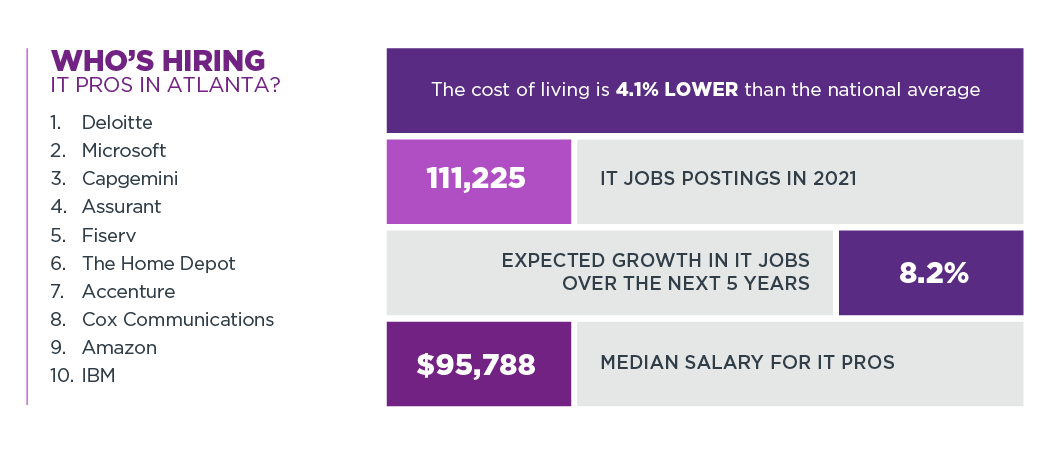
(Dallas-Fort Worth-Arlington, TX)
Opportunity is still the name of the game in Dallas. The longstanding home of well-known corporations like AT&T, ExxonMobile and Southwest Airlines, the tech scene in this metro area has been rapidly emerging as one of the best places for IT jobs for entrepreneurs and enterprises alike. In fact, in 2021 the area advertised for more than 156,000 IT jobs. That figure rivals larger metro areas like New York City and Washington, D.C. But why Dallas?
For one, lower operating costs. Companies have been fleeing California for cities like Dallas over the past few years. The Lone Star State gained 114 of the known 265 California companies that relocated their headquarters between January 2018 and June 2021.
Another reason? Access to diverse tech talent. The Dallas-Fort Worth area ranks in the first quartile when it comes to overall race and ethnicity characteristics within the tech workforce via a metric called Simpson’s Diversity Index.
Perhaps that’s why three of the fastest-growing companies in Dallas recognized by Inc. are tech companies:
With this kind of success, it’s no surprise that IT job growth in the Dallas metro area is expected to grow by 2.8% in the next year and by 10.5% over the next five years to nearly 203,000 jobs. And IT pros can make a good living here. The median salary in the Dallas-Fort Worth area sits at $97,431 – that’s a $3,300 raise from last year.
The cost of living is slightly less than the national average here, but home prices are keeping pace. According to Texas REALTORS, the median price of a single-family home is $354,000, compared to the 2021 national average of $346,000. With summer temps reaching 100 degrees and a lucrative IT salary, maybe you spring for a backyard pool!
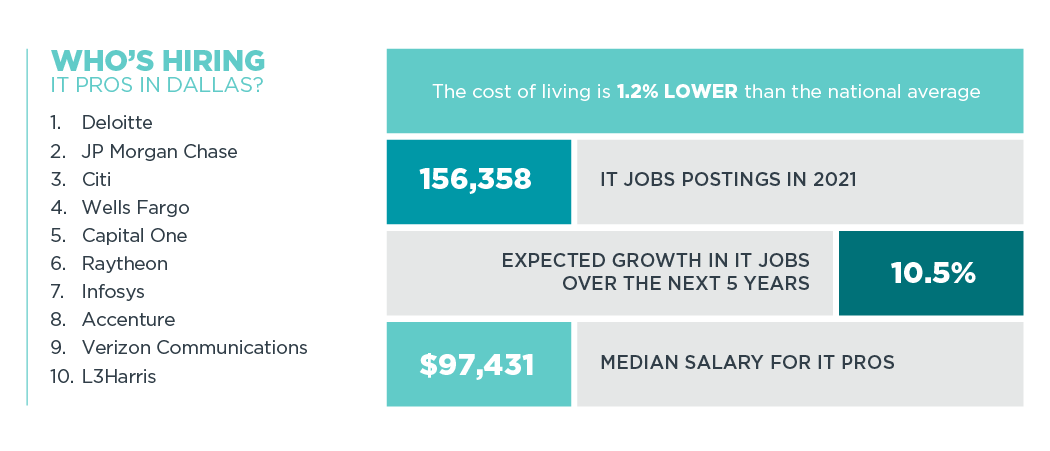
(San Jose-Sunnyvale-Santa Clara, CA)
San Jose has long been the ultimate destination for anyone wanting to work in technology and considered one of the best cities for tech jobs. And while the metro area has appeared in the Tech Town Index top 5 since the existence of this report, this is the first year sunny San Jose has cracked the top two. While other areas of the country make headlines for technology innovation and growth, some still consider Silicon Valley to be the hub of the industry’s brightest minds – and for good reason.
This area hosts 7,894 scaleups, or tech companies, that have raised over $1 million each since inception, and $501.3 billion in total capital according to Crunchbase data. To put that number in perspective, that’s about half of the total capital made available to U.S tech companies.
This statistic is important as it’s also true that more and more startups are leaving the state of California. Factors like an exceptionally high cost of living, competition for talent, overreaching state regulation and high taxation on personal income play key roles in the decision to take your tech startup somewhere else – like Texas.
But even with fewer startups, Silicon Valley is holding its own. Case in point, there were just under 100,000 open IT jobs advertised for last year – 98,315 to be exact. More than 36,000 of those postings were for software developers and engineers. That’s a lot of opportunity – even with a lot of people. In fact, in 2020 the San Jose metropolitan area had 705.6 positions per 10,000 people, according to data from the U.S. Bureau of Labor Statistics.
And while the cost of living is famously high here – San Jose ranks no. 18 in the affordability category – tech employers factor that into your salary. The median annual salary for an IT pro in this metro area is $148,607 – that’s $52,592 more than the national average.
There’s no doubt that for some, getting a job in Silicon Valley is like climbing Mt. Everest. You’re sure to work with some brilliant minds and get paid handsomely for what you do. But oftentimes, work–life balance is lacking in the epicenter of innovation, and it’s likely that much of your income would go toward housing. Is it worth it? The nearly 169,000 tech workers here say it is.
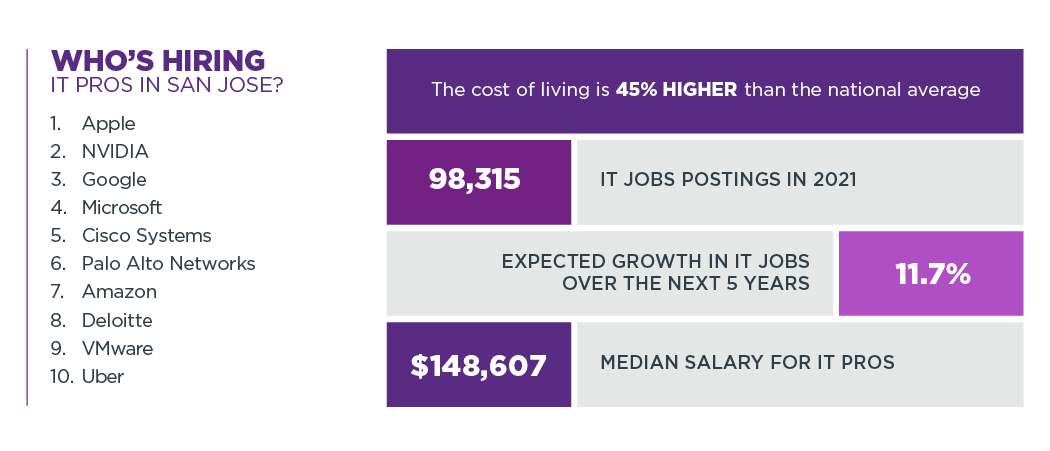
(Austin-Round Rock, TX)
There’s no question that Austin is a tech mecca and one of the top tech cities. The proof? The Austin-Round Rock metro area tops the Tech Town Index for its third consecutive year. It offers an attractive combination of opportunity, affordability and good old-fashioned real estate that keeps technology companies – and talent – flocking to the Lone Star state’s capital city.
In fact, the area posted 64,481 technology jobs in 2021 and continues to top the list for 1-year (3.75%) and 5-year (13.9%) projected growth in jobs. Companies like IBM, Deloitte, Dell, Amazon and General Motors are the top recruiters of IT pros in the metro area, and they pay pretty well.
The median tech salary in Austin is $90,459, which feels more like $93,643 when adjusted for Austin’s more affordable cost of living. While it can be argued that the city’s affordability rating is decreasing due to a population surge, only three other metro areas on the Tech Town Index rank higher in the category of cost of living – Lansing, Atlanta and Huntsville.
Of course, it’s not just technology companies making the move to Austin. Low operating costs mean that businesses in nearly every sector are calling Austin home – and recent population numbers reflect that. Proving that point, Tesla recently moved its headquarters from Silicon Valley (Palo Alto, to be exact) to Austin.
According to the U.S. Census Bureau, Austin’s multi-county metro population increased to an estimated 2,295,303 people as of July 2021. This is a 3% increase from the previous year, making it the fastest growing large metro area in the country.
The obvious question is: Can this bona fide tech hub continue to grow at its current pace?
Many believe it can. Experts cite ideal conditions for business creation like access to capital, skilled workers and affordable office space as key factors appealing to startups and enterprise companies alike. WalletHub recently ranked Texas as the number-one state to start a business for these exact reasons.
But the IT pros who live and work in Austin say that it’s the attention to work–life balance, access to educational opportunities and the city’s distinctive culture that keep them working in Austin – and feeling wonderfully weird.
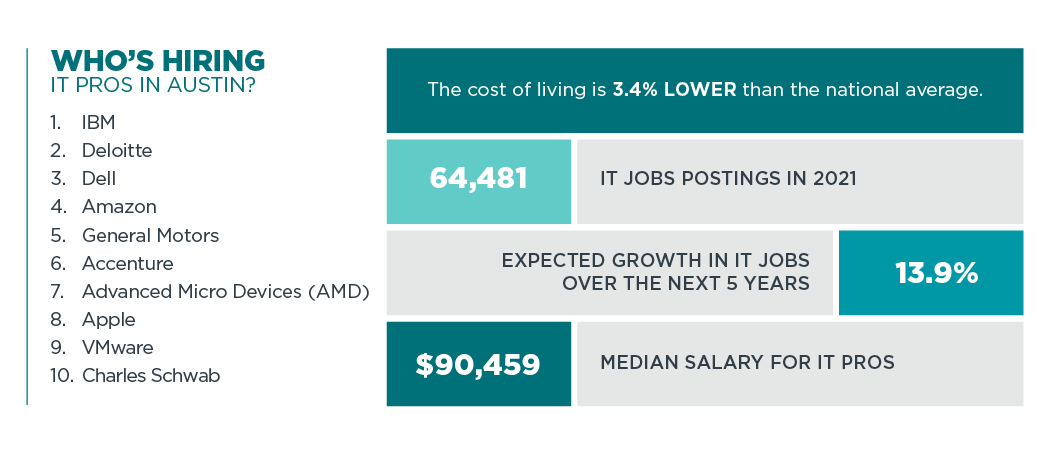
Best Cities to Start Your IT Career in the United States
| Metropolitan Statistical Area | Tech Town Index Rank | Location Quotient Rank (no. IT job ads) | #IT Job Ads Rank | Cost of Living Index Rank | Cost of Living Adjusted Median Hourly Earnings Rank | 1-year % Job Growth Rank | 5-year % Job Growth Rank | 2020 Tech Town Index Rank | 2019 Tech Town Index Rank | 2018 Tech Town Index Rank |
| Austin-Round Rock, TX | 1 | 5 | 8 | 4 | 9 | 1 | 1 | 1 | 1 | 3 |
| San Jose-Sunnyvale-Santa Clara, CA | 2 | 1 | 6 | 18 | 2 | 3 | 3 | 4 | 3 | 4 |
| Dallas-Fort Worth-Arlington, TX | 3 | 9 | 3 | 8 | 6 | 4 | 4 | 2 | 7 | 6 |
| Atlanta-Sandy Springs-Roswell, GA | 4 | 10 | 5 | 2 | 4 | 10 | 10 | 8 | 8 | 9 |
| Huntsville, AL | 5 | 4 | 16 | 3 | 3 | 9 | 9 | 9 | 10 | 10 |
| Charlotte-Concord-Gastonia, NC-SC | 6 | 11 | 9 | 6 | 8 | 6 | 5 | 5 | 6 | 1 |
| Raleigh-Cary, NC | 7 | 6 | 11 | 5 | 5 | 8 | 11 | 3 | 2 | 2 |
| San Francisco-Oakland-Hayward, CA | 8 | 8 | 4 | 19 | 15 | 2 | 2 | 7 | 5 | 5 |
| Seattle-Tacoma-Bellevue, WA | 9 | 16 | 7 | 14 | 1 | 5 | 7 | 6 | 4 | 7 |
| Washington-Arlington-Alexandria, DC-VA-MD-WV | 10 | 2 | 2 | 12 | 7 | 16 | 16 | 11 | 11 | 11 |
| Lansing-East Lansing, MI | 11 | 7 | 19 | 1 | 18 | 13 | 13 | n/a | n/a | 13 |
| Baltimore-Columbia-Towson, MD | 12 | 12 | 10 | 16 | 16 | 12 | 6 | 17 | 20 | 16 |
| Durham-Chapel Hill, NC | 13 | 14 | 13 | 9 | 10 | 11 | 15 | 13 | 13 | 15 |
| Trenton-Princeton, NJ | 14 | 3 | 17 | 13 | 14 | 15 | 14 | 20 | n/a | 18 |
| Boulder, CO | 15 | 19 | 18 | 12 | 13 | 7 | 8 | 12 | 14 | 19 |
| New York-Newark-Jersey City, NY, NJ, PA | 16 | 20 | 1 | 17 | 17 | 14 | 12 | n/a | n/a | n/a |
| Colorado Springs- | 17 | 17 | 14 | 11 | 11 | 17 | 17 | 15 | 16 | 20 |
| Des Moines-West Des Moines, IA | 18 | 18 | 15 | 7 | 12 | 18 | 18 | n/a | n/a | 12 |
| Hartford-East Hartford-Middletown, CT | 19 | 13 | 12 | 15 | 19 | 20 | 19 | n/a | n/a | n/a |
| Tallahassee, FL | 20 | 15 | 20 | 10 | 20 | 19 | 20 | n/a | n/a | n/a |
CompTIA’s Tech Town Index is a snapshot created to provide some guidance on locations to consider a tech job. It is not meant to measure everything. It gives a unique look into key locations, as it goes beyond number of jobs and considers factors such as job postings, projected job growth, real wages, and cost of living. It also addresses the increase in remote work opportunities.
The initial top 20 metropolitan statistical areas (MSAs) are selected based on location quotient (LQ) using Emsi Burning Glass data, i.e., number of IT job postings as a portion of all job postings per MSA compared to nationwide over the last 12 months.
A location quotient is a measure of concentration, comparing local concentrations to the national level. All 20 of these metro areas have a much higher or higher demand than average as far as number of IT job postings by all job postings in comparison to the United States as a whole.
Note: There was a change in the formula Emsi Burning Glass uses to calculate LQ (which formerly used employment figures). Hence, some year-over-year changes may also be a result of this update.
Additional factors are then considered to develop CompTIA’s ranking among these 20 MSAs, including actual number of job ads, projected job growth, cost of living (CoL) and earnings adjusted for CoL.
Which Variables Are Included in CompTIA’s Ranking?
CompTIA’s Index is based on two variables for each of three main factors for job postings, CoL and projected job growth.
| Variables | Data Sources |
|---|---|
| Location Quotient Rank (no. job ads by number people employed)* | Emsi Burning Glass |
| Number of Job Ads (over last 12 months) | Emsi Burning Glass |
| Cost of Living Index | Emsi Burning Glass | C2ER |
| Cost of Living Adjusted Median Earnings (2020) | Emsi Burning Glass | BLS |
| 1-Year Job Growth (percent change 2021-2022; shorter term view) | Emsi Burning Glass | BLS |
| 5-Year Job Growth (percent change 2021-2026; longer term view) | Emsi Burning Glass | BLS |
| Median Salary (2020)** | Emsi Burning Glass | BLS |
*Primary factor in determining initial list of 20 MSAs to review.
**Not used in rankings but data provided.
How Is CompTIA’s Ranking Determined?
After the pool of 20 MSAs is determined using location quotient data from Emsi Burning Glass, CompTIA ranks each of the six variables above from 1st to 20th for each MSA. The mean average is then figured among all six variables per MSA. The resulting mean average, or score, per MSA then determines the overall ranking for CompTIA’s final list.
Additional Notes
Only large or very large MSAs (250,000 or more residents) are included in CompTIA’s Index.
On the occasion when the mean average ties, the MSA with the higher LQ is ranked higher.
CompTIA’s Index is based on data available as of October 2021.
CompTIA’s Index is based on core information technology (IT) occupations such as support, networking, cybersecurity, software and web development, data science, database administration, management and so on.
Job posting data is a useful, but imperfect, proxy for job demand. Not every posting translates to a new job; hiring firms may change their plans, post multiple times for the same job, hire internally, try different approaches to find the right candidate and so forth. Also, one ad may be posted for multiple openings. Emsi Burning Glass addresses many of these issues, but not all. CompTIA recommends using job posting data in conjunction with employment data to get a more complete picture of labor dynamics for a given occupation category.
CompTIA subscribes to numerous data sources including Emsi Burning Glass. In addition to these sources incorporating U.S. government data such as from the Bureau of Labor Statistics (BLS), Emsi Burning Glass contains data from C2ER’s COLI. The Cost of Living Index (COLI) is comprised of six major categories: food, housing, utilities, transportation, health care, and miscellaneous goods and services.
There are many factors to consider when evaluating wages. In addition to location, wages vary based on occupation, industry, company size, etc., as well as individual factors such as experience and education.
See CompTIA Cyberstates for additional tech jobs and industry data or for other metro areas such as Boston, MA; Chicago, IL; Houston, TX; Los Angeles, CA; Phoenix, AZ; Philadelphia, PA; Miami, FL and many more.
Cyberstates also includes more information on Simpson’s Diversity Index. This index weights two key facets of race and ethnicity within the workforce – richness and evenness (or think of it as depth and breadth) and reflects it in a single metric for each location covered in this comprehensive report. The Tech Town Index highlights Tech Towns that rank well on Simpson’s Diversity Index.
CompTIA Cyberstates (U.S. Tech Industry and Workforce Trends)
CompTIA Canadian Tech Industry and Workforce Trends
CompTIA Tech Jobs Report (monthly IT employment tracker)
CompTIA UK Tech Industry and Workforce Trends
CyberSeek (cybersecurity job trends and resources)
U.S. Bureau of Labor Statistics, Occupational Outlook Handbook
What Kind of Jobs Can You Get with CompTIA Certifications?
Read more about IT Workforce.
Tags : IT Workforce